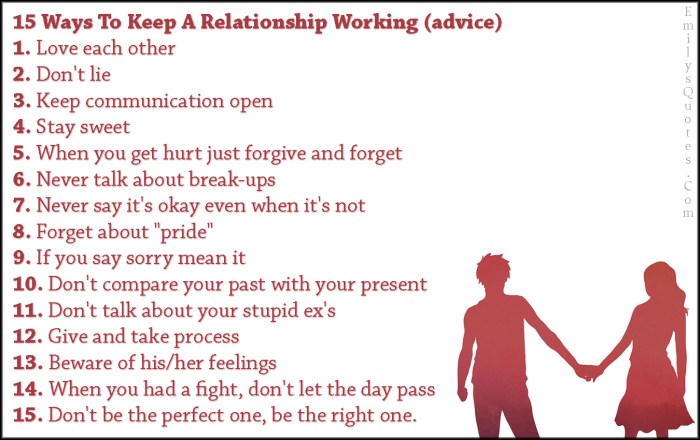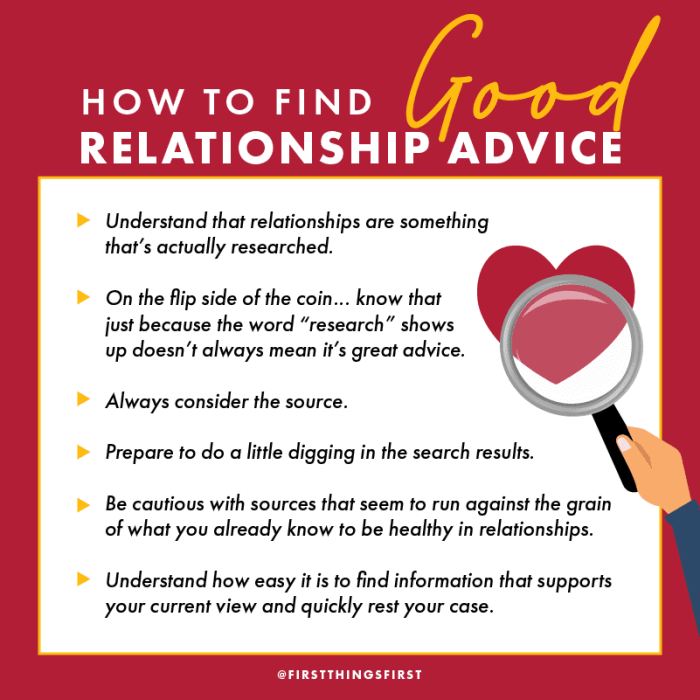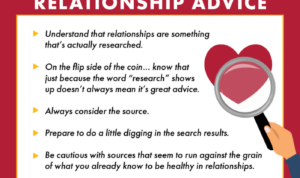Relationship Advice sets the stage for this enthralling narrative, offering readers a glimpse into a story that is rich in detail with american high school hip style and brimming with originality from the outset.
Whether you’re navigating the complexities of love or aiming to strengthen your bond, relationship advice plays a crucial role in guiding individuals towards fulfilling and lasting connections. From unraveling common pitfalls to enhancing communication skills, this guide dives deep into the realm of relationship advice to help you navigate the intricacies of modern-day relationships with flair and finesse.
Importance of Relationship Advice
Seeking relationship advice is crucial for maintaining healthy relationships because it provides an outside perspective, helps improve communication, and resolves conflicts effectively.
Enhancing Communication
Relationship advice plays a vital role in enhancing communication between partners. By learning effective communication techniques, such as active listening and expressing feelings openly, couples can avoid misunderstandings and strengthen their bond.
Resolving Conflicts
Relationship advice offers strategies to resolve conflicts in a constructive manner. Learning how to navigate disagreements and find common ground allows couples to address issues without damaging the relationship.
Long-Term Success
Implementing relationship advice can have a significant impact on long-term relationship success. By continuously working on the relationship, seeking guidance when needed, and adapting to changes, couples can build a strong foundation for a lasting and fulfilling partnership.
Sources of Relationship Advice
Seeking relationship advice can be crucial for maintaining healthy and fulfilling connections with others. There are various sources individuals can turn to for guidance in navigating the complexities of relationships.
Professional Counselors
Professional counselors, such as therapists or psychologists, are trained to provide expert advice and support for individuals dealing with relationship issues. They offer a safe and confidential space for couples or individuals to address their concerns and work towards improving their relationships.
Friends and Family
While friends and family members may not have the same level of expertise as professional counselors, they can offer valuable insights based on personal experiences. Seeking advice from loved ones can provide emotional support and a different perspective on relationship challenges.
Self-Help Books
Self-help books written by relationship experts can offer practical advice and strategies for improving communication, resolving conflicts, and building stronger connections. These resources allow individuals to learn at their own pace and apply the advice to their unique situations.
Online Forums and Resources
Online forums and resources provide a platform for individuals to seek advice, share experiences, and connect with others facing similar relationship issues. While these platforms can offer a sense of community and diverse perspectives, it’s important to verify the credibility of the information shared.
Common Relationship Problems: Relationship Advice

Relationships can face a variety of challenges that can strain the bond between partners. Addressing these issues is crucial for maintaining a healthy and fulfilling relationship.
Communication Breakdown
One of the most common issues in relationships is a breakdown in communication. This can lead to misunderstandings, arguments, and feelings of being unheard or unappreciated.
- Partners not listening to each other’s concerns
- Misinterpretation of words or actions
- Avoidance of difficult conversations
Trust Issues
Lack of trust can erode the foundation of a relationship, leading to insecurity, jealousy, and suspicion.
- Infidelity or betrayal
- Secret-keeping or dishonesty
- Insecurities from past experiences
Intimacy Problems, Relationship Advice
Intimacy is not just physical; emotional and mental connection are also essential for a strong relationship. Issues in this area can lead to feelings of distance and disconnect.
- Lack of physical affection or intimacy
- Inability to open up emotionally
- Differences in sexual desires or preferences
Effective Communication in Relationships
Effective communication is the key to maintaining healthy and strong relationships. It involves expressing thoughts, feelings, and needs openly and honestly while also actively listening to your partner. Without effective communication, misunderstandings, conflicts, and resentment can build up over time, leading to relationship breakdowns.
Strategies for Improving Communication
- Set aside dedicated time to talk and listen to each other without distractions. This could be a daily check-in or a weekly sit-down conversation.
- Practice active listening by giving your full attention to your partner, making eye contact, and paraphrasing what they say to ensure you understand correctly.
- Use “I” statements to express your feelings and needs without blaming or accusing your partner. For example, say “I feel upset when…” instead of “You always make me angry when…”
- Show empathy by trying to understand your partner’s perspective and feelings, even if you disagree. Validate their emotions and let them know you care about their well-being.
- Avoid interrupting or getting defensive during conversations. Respect your partner’s opinions and feelings, even if they differ from your own.
The Role of Active Listening and Empathy
Active listening involves fully concentrating on what your partner is saying, understanding their message, and responding thoughtfully. It shows respect and builds trust in the relationship. Empathy, on the other hand, is the ability to understand and share the feelings of another person. By practicing empathy, you can deepen your emotional connection and create a supportive environment for open communication in your relationship.
Building Trust and Intimacy

Building trust and intimacy is crucial in creating a strong and lasting relationship. Trust forms the foundation of any healthy relationship, while intimacy helps to deepen the emotional connection between partners.
The Significance of Trust and Intimacy
Trust allows partners to feel secure, respected, and valued in the relationship. It is built over time through consistent actions and honesty. Intimacy, on the other hand, involves emotional closeness, vulnerability, and a sense of connection that goes beyond physical attraction.
Tips on Building Trust and Intimacy
- Show honesty and transparency in communication.
- Respect boundaries and privacy.
- Listen actively and be empathetic towards your partner’s feelings.
- Share your thoughts, fears, and dreams openly.
- Engage in activities that promote bonding and connection.
The Role of Vulnerability and Emotional Connection
Vulnerability allows partners to be open and honest about their feelings, fears, and insecurities. This level of openness fosters a deeper emotional connection and helps to build trust within the relationship. Emotional connection involves being present for your partner, understanding their needs, and showing empathy and support during difficult times.
Seeking Professional Relationship Advice
When it comes to navigating the complexities of relationships, seeking advice from professional relationship counselors or therapists can offer valuable insights and guidance.
Benefits of Seeking Professional Help
Here are some benefits of seeking advice from relationship counselors or therapists:
- Objective perspective: Professionals can offer an unbiased view of the relationship dynamics and help both parties see things from a different angle.
- Effective strategies: Therapists can provide tools and techniques to improve communication, resolve conflicts, and strengthen the bond between partners.
- Safe space to express: Counseling sessions provide a safe environment for couples to express their thoughts, emotions, and concerns without judgment.
When to Consider Professional Help
It might be appropriate to consider professional help for relationship issues when:
- Communication breakdown: When communication becomes strained or ineffective, leading to misunderstandings and conflicts.
- Recurring problems: If the same issues keep resurfacing without resolution, indicating deeper underlying issues.
- Lack of intimacy: When emotional or physical intimacy diminishes, affecting the overall connection between partners.
Finding the Right Professional
Here are some tips for finding the right professional to offer relationship advice and support:
- Research qualifications: Look for licensed therapists or counselors with expertise in couples therapy.
- Compatibility: Choose a professional with whom both partners feel comfortable and can establish a rapport.
- Seek recommendations: Ask for referrals from trusted sources or read reviews to find a reputable professional.
